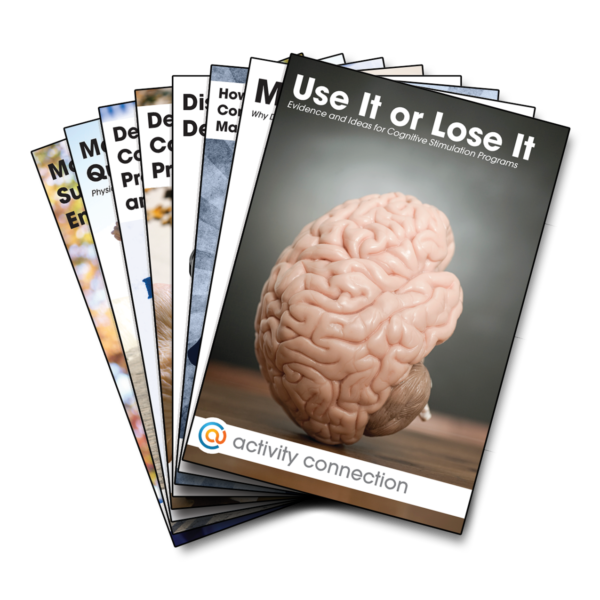Cognitive Stimulation Vol. 06
Volume 6: Developing Your Own Cognitive Stimulation Program: Best Practices and Motivating People
In this presentation, you will learn important principles to maximize the efficacy of cognitive stimulation and other activity programs. Essential topics such as screening potential participants, challenging more capable participants, size of classes, and frequency of classes will be discussed. You will also learn how to motivate participants to engage in cognitive stimulation programs and other activities.
Learning Objectives
- Be able to screen potential participants to determine the appropriateness of a cognitive stimulation program and level of program difficulty that would be appropriate for a potential participant.
- Be able to describe optimal class size and frequency, as a function of class level, setting, and number of instructors.
- Know strategies to increase participants’ motivation to engage in activities.
DVDs have been discontinued. This updated video is now available on the course test page.
Related products
Most recent products from this category

Cognitive Stimulation
Volume 8: Maximizing Social Support and Social Engagement In this presentation, you will learn how social support and loneliness are related to mental and physical health outcomes. You will learn many invaluable strategies to maximize social support and engagement among older adults in a variety of environments. These strategies can dramatically improve quality of life for many older adults. Learning Objectives
- Better understand how perceptions of social support and loneliness can change during older adulthood.
- Better understand how perceptions of social support and loneliness can affect mental and physical health.
- Be able to describe numerous strategies to enhance perceptions of social support and decrease loneliness.

Cognitive Stimulation
This complete set of eight courses, is offered for $199.50, a discount of more than 1/3 when compared to purchasing the courses separately. After viewing the videos and passing the online tests, you will become a Certified Cognitive Stimulation Instructor. A certification like this demonstrates that you are on the cutting edge. Families will be comforted to know that you and your community care about their loved ones and their quality of life. People who complete the certification training and testing will be certified for two years. To become recertified, they just need to complete 3 hours of training and testing within the two years before their certification expires. DVDs have been discontinued. This updated video is now available on the course test page.

Cognitive Stimulation
Volume 2: Memory: Why Do We Forget, How Does Memory Change as We Age? In this presentation, you will learn how we make new memories, why we forget, and how memory changes as we age. There is good news, in that some cognitive abilities remain relatively intact and we’ll discuss how to take advantage of those in older adults with memory impairment. Learning Objectives
- Be able to tell the difference between different types of memory and how they change as people age or develop dementia.
- Know why memory failures occur.
- Be able describe the types of cognitive abilities that remain relatively intact during older adulthood and through most stages of dementia.

Cognitive Stimulation
Volume 3: How the Brain Makes Memories, Controls Behavior, and is Related to Many Common Problem Behaviors In this presentation, you will learn how the various lobes of the brain help control mental processes. In particular the role of attention and concentration (i.e., executive functioning) in the lives of aging adults will be discussed. Also, valuable information about enhancing executive functioning in order to maximize quality of life, in people who already have memory impairment, will be discussed. Learning Objectives
- Be able to help people with memory impairment process information at a deeper level in order to encode new memories.
- Be able to describe what lobes of the brain handle basic cognitive functions (e.g., attention, language, vision, and planning).
- Be able to describe different behaviors and interventions that can improve executive functioning (i.e., attention, inhibition, and planning).


